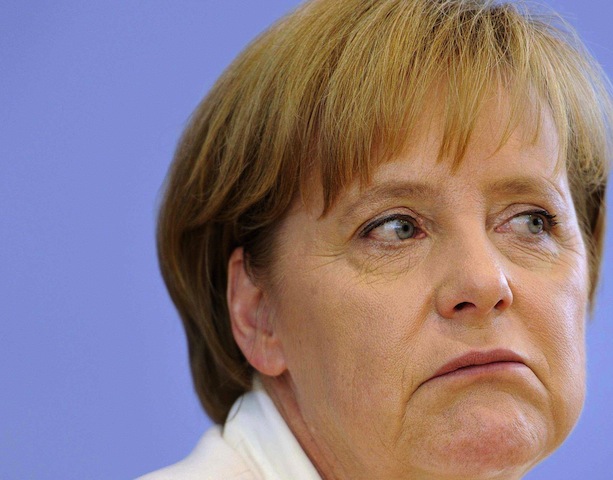(Angela Merkel | Source: Egypt Independent)
The only surprise from Germany’s election was how close Angela Merkel’s Christian Democratic coalition came to winning an outright majority. Thus the weeks of waiting for her to claim victory gave progressives and Obama administration plenty of heartburn.
| The Social Democrats have a strong enough hand to force Merkel to agree to broad economic stimulus and a big boost in wages because this election also produced Germany’s first legitimate ultra-right wing party, one that could undercut Merkel’s party. |
She gave the White House heartburn by ignoring its pleas to invest more to boost worldwide economic growth and lower unemployment. Merkel also ignored pleas to just do something substantive on the Euro crisis or financial reform—she preferred to do the least possible.
Progressives, meanwhile, watched helplessly as voters were lured by the Chancellor’s vapid “nanny for Germany” campaign (“Mutti Merkel,” the press dubbed it) and ignored the agendas from the left to protect Germany’s renewable energy program, pass an economic stimulus and take action to reverse Germany’s growing income inequality.
So the election’s over, Merkel’s conservatives rule the roost and it will be a long, hard slog for progressives, right? Maybe not: German politics is rarely simple and the left may yet get a role.
For starters, Merkel’s Christian Democratic Alliance did come within a whisker of a majority but she did it by cannibalizing her economically conservative/socially liberal coalition partner, the Free Democratic Party, thus driving the only moderate party out of the Bundestag.
So the incoming German parliament has the strongest right-left divide ever in the postwar era, but it is still the left that controls the most seats. True, it is a bitterly divided left, but they hold the balance of power since Merkel will not attempt a minority government.
To understand why, here’s quick history lesson.
Germany’s party-list parliamentary system owes its origins in part to a system devised by Thomas Jefferson to ensure that legislative representation was proportionate to the candidates whom the voters picked. (It seems this founding father was also a whiz at math and wanted a House of Representatives that reflected the will of the people. Jefferson’s system was used in a couple of House elections until his math-impaired fellow citizens turned the process over to gerrymanderers, leaving us with results like the one in 2012, where a minority party can won a majority of House seats.)
So just like the Weimar Republic, today’s German voters cast two votes, the first for a district representative, the second for a party platform. But unlike Weimar, parties need to win a minimum 5 percent to go to the Bundestag. Also, unlike Weimar, which had nine elections in 14 years and was dominated by minority governments (including the one that gave Hitler the keys to the kingdom), it is now more difficult to force votes of no-confidence or to form a minority government.
Thus, even if Merkel wanted to form a minority government, she knows the left could block her and, even more importantly, the left still controls Germany’s oft-forgotten upper chamber, the Bundesrat, which has the power to veto legislation.
So with no moderates to chose from, Merkel has to form a coalition with a left-wing party and her only choices are the Greens and the Social Democrats.
The Greens are the less likely choice: while Merkel, a former research scientist, believes in climate change and has an aversion to nuclear power (confirmed by the Fukushima disaster), she does have climate skeptics in her alliance and the differences between these parties are too great.
Which leaves her the Social Democrats (SPD), the only other party besides Merkel’s that picked up seats and, despite having been co-founded by Karl Marx’s partner, Friedrich Engels, the SPD is now the most business-friendly left-wing party in Germany.
For now, the mainstream media thinks Merkel holds all the cards, due to the results and the disastrous campaign run by the SPD leader, Peer Steinbrueck, who ran as a leftist maverick but, like a right-wing political maverick, Sarah Palin, was hurt by number of laughable gaffes.
Yet I would argue the SPD has a strong enough hand to force Merkel to agree to broad economic stimulus and a big boost in wages because this election also produced Germany’s first legitimate ultra-right wing party, one that could undercut Merkel’s party.
While ultra-right parties have been able make waves locally, previous attempts to form a national far-right party resulted in groups tied to neo-Nazis, making these parties unacceptable to the larger electorate.
But the Greek bailout and Euro crisis sparked a new ultra-right, anti-European Union alliance, the Alternative for Germany. This deliberately bland name was chosen to suggest it had no ties to nationalists or neo-Nazis (even though both groups supported them) and while it barely missed the 5 percent bar to enter the Bundestag, they are polling strongly for the European parliamentary elections that will be held in 2014.
So because both Merkel’s party and the SPD are pro-Europe, she will likely reach out to them but their price for a coalition may be the policies that the Obama administration and progressives have sought for over two years.
Peter Lindstrom is a political consultant and researcher. He lives in Washington, D.C.







0 Comments